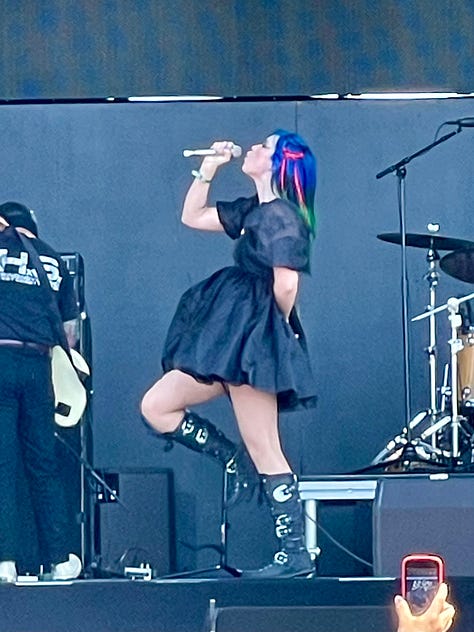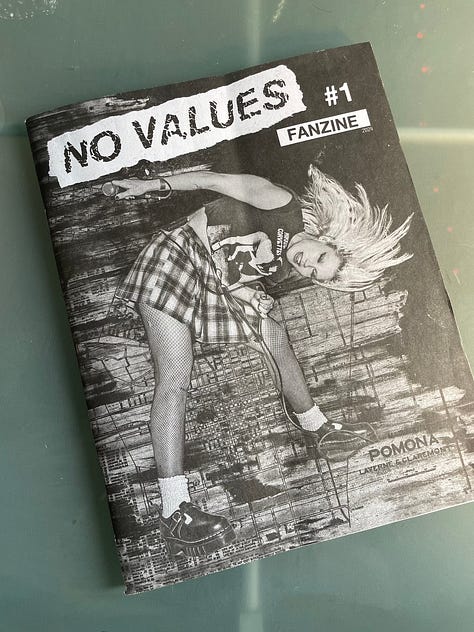Well, after talking all kinds of shit about No Values in last week’s edition of Message from the Underworld, I attended the festival. What can I say?
I’m a hypocrite. I’m a ho. I was offered a free ticket so off I went to the show.
It’s a two-hour drive from San Diego to the Pomona Fairplex—without traffic (chuckles darkly). My plan was to arrive early and leave early. I left a little after ten and made good time until I got to Pomona a little after noon, but the entrance to the Fairplex was backed up and I spent over an hour making my way to the parking lot.
I made it inside the park in time to see Soul Glo and they crushed. I love their experimental screechy hardcore and had never seen the band before. There was a decent-sized crowd but I was able to get fairly close and kids were into it, which is always great to see early in the afternoon.
Scowl was next. I’ve been to two shows that had Scowl on the bill and missed them both times (Circle Jerks/Descendents in Sacramento and Punk Rock Bowling in Las Vegas). I’m not a big fan of the Santa Cruz band’s breakout song “Opening Night,” which is a bit too poppy for my taste, but seeing them live won me over. Scowl also recently pulled out of the Download Festival due to Barclay’s sponsorship. Good for them.
I met up with Paul Rachman and we went over to watch Black Flag in the VIP section. Paul had been gifted a pair of tickets and technically I was his +1. (Thank you, Paul!) The way the Fairplex was set up there were a pair of stages on one end of the festival grounds, and two larger stages set up side by side across from the grandstand with the VIP area linking them together. There was a fifth stage for DJ sets but I never figured out where it was. That’s how big the place was.
I didn’t really have a plan other than to see as much as I could. Everything was so far apart that it took a while to move around and as the afternoon wore on and the grounds got more crowded the casino effect took over. Have you ever been in a hurry in a casino? You invariably get stuck behind the slowest person on the property. No Values was a mix of people who were moving fast, those who were meandering along with plates of food and cups of beer, and those who weren’t moving at all, just sitting wherever they felt like it.
Black Flag was pretty terrible. They sounded like a cover band, which in a sense they are, but a rock and roll cover band, which is far worse. Paul observed that every song sounded the same. I saw Huntington Beach’s drum and bass duo The Garden, Bad Religion, and Iggy Pop on the same stage and they all sounded phenomenal, so I don’t know what was up with Black Flag’s sound. Maybe it was intentional. This was my first time seeing Greg Ginn play since I started work on Corporate Rock Sucks. I’m not going to say it was a big letdown because I wasn’t expecting much. It dawned on me that if Ginn spent the rest of his days at a local bar somewhere, sitting in with the musicians passing through town, he’d be a legend. But this?
Just another piece of the puzzle that is Greg Ginn.






I posted some photos on Instagram and had a million messages from friends who’d made the trek to No Values. Unfortunately the vastness of the Fairplex and the 45,000 people all using the Internet at the same time throttled my phone, making it difficult to connect.
I did meet up with my friend Flack from Santiago, Chile at the Trust Booth where Paul and I were interviewed about the My Damage movie. I also bumped into living legend Edward Colver, and his saltiness about, well, everything, made the trip worthwhile.
At some point I saw The Damned who played in the heat of the day and looked like vampires who’d been tricked out of their coffins. I hope they were wearing sunscreen.
Back in the VIP area I met up with my friend Melissa Cody to catch Bad Religion’s set. I haven’t seen the band play in about a year and, as always, I was blown away by how good they sound, the energy of the performance, the intensity of the lyrics. It reaffirmed my belief that Bad Religion is a true outlier in the SoCal punk scene. No other band has Bad Religion’s combination of vision, range, or talent. Whether it’s Greg Graffin’s superb vocals, Brian Baker’s under-appreciated guitar playing, or Jay Bentley’s infectious spirit, it’s always a great time.
At most shows Greg asks how many people are seeing the band for the first time and a gang of people raised their hands. “Where the fuck have you been?” Bentley quipped. Where the fuck, indeed.
I then boogied across the VIP area to see Turnstile, a band I may have fallen out of love with. I was late to the party and then for a brief period I obsessed over the band while recovering from COVID in Belfast, a strange and haunting time in the wake of my mother’s passing. But that’s me. By the time Turnstile took the stage it felt like all 45,000 people who attended the festival had arrived, the sun was going down, and I was often distracted by the videos on either side of the stage, which mostly showed handheld camera footage of the audience. It was like watching an expertly edited No Values concert video during the actual concert. Talk about selling your scene back to you.
Next, I watched a half-dozen songs from Iggy Pop’s set, which was shockingly good. After one song, Iggy declared, “Fuck, fuck, fuck, fuck, fuck!” Like he couldn’t believe he was still doing this shit.
I hear you Iggy. It was time to go.
I had a long drive back to San Diego ahead of me. The notion that the Misfits were headlining the festival would be appalling if it wasn’t such a cheapjack corporate farce. More than one band couldn’t remember the lyrics to their own songs. The venue had all the intimacy of a haunted amusement park. I spent $22 on rice and beans. Wattie tried to manufacture some outrage by talking shit about Jello Biafra but his band shit the bed. Glenn Danzig called the pandemic fake. The earth slowed on its axis as 44,999 people yawned at once. A bunch of old punks got to see some older punks play one more time before they all die and Goldenvoice made a shit-pile of dough. “Some’s bastards, some’s ain’t, that’s the score,” which is funny until you remember what a terrible human being William S Burroughs was.
A poem:
Corporate Punk Sucks Blues Sponsored by Pedialyte
Comfortable shoes
And compression socks
This is how we do
Punk rock
In Pomona
Walk for miles
In the blistering heat
But, hey, at least
The water’s free
In Pomona
The food is pricey
And so are the brews
No Values means
No tip for you
In Pomona
You’re old, white
And lacking spirit
Next time try not to
Forget the lyrics
In Pomona
Will we be back?
I don’t think so
This isn’t the place
For a punk rock show
Fucking Pomona
Tananarive Due’s The Reformatory
My trip to Pomona and back went by in the blur because I listened to Tananarive Due’s The Reformatory, a heartbreaking ghost story set in a Jim Crow-era reform school. I interviewed Due, who took away the top prize in the horror novel category at StokerCon, for Saturday’s L.A. Times Book Club newsletter. You really don’t want to miss it.
Now, I want to talk about another book, one of the most entertaining music books I’ve read in a long, long time. Believe it or not, it’s a book about the Grateful Dead.
Living with the Dead: Twenty Years on the Bus with Garcia and the Grateful Dead
Sometimes when I’m backstage at a concert, I’ll catch a glimpse of the band’s tour manager screaming at someone on the phone or handling some crisis that has erupted and think to myself, “I wonder what that’s about?” and then go back to enjoying the show without giving it another thought.
It’s happened enough times to make me wonder if all the things that musicians say to journalists and that people like me write about in books is bullshit. I’m convinced that every band has a secret history that only those privy to the machinations of moving a rock band, its crew, and all their equipment around the world can know. Sometimes this secret history is kept hidden from even the band or at the very least no one member knows all the near-disasters that were averted by a combination of luck, pluck, and the vagaries of chance.
Living with the Dead is one such history. It was written by Rock Scully, the band’s longtime manager, and David Dalton, a founding editor of Rolling Stone. It is an astonishingly well written book that endeavors to show the reader the world the Grateful Dead stepped into in 1965, how it changed that world, and was in turn changed by it.
I knew I was going to like the book almost immediately because Scully never puts the band on a pedestal. In fact, he talks a great deal of shit about the band, especially Bob Weir, the only original member of the band I saw play with Dead and Company at The Sphere last month.
Here’s Scully on the early Dead:
“These aren’t songs in any conventional sense, they are catchpenny epics of noodling, circling riffs. Holding patterns of songs. Garcia carries on these long, looping musical, telepathic conversations with his guitar, adjusting the flow from beat to beat, drifting from mood to mood.”
I’ve always been drawn to “life and times” histories, so that I learn something about the world the subject inhabited, and Scully delivers by immediately dropping the reader—and the Grateful Dead—into one of Ken Kesey’s Acid Tests. Suddenly there’s Ken and Merry Pranksters and Neal Cassady, good old Dean Moriarity, and the mysterious Owsley Stanley, the audio engineer and LSD alchemist. In a matter of pages Scully links San Francisco’s North Beach, the Beat Movement, the coffeehouse scene, and the acid-loving freaks that will define the 1960s.
I don’t want to sound naïve, but I didn’t expect so much LSD. I mean I knew the Dead took lots and lots of acid—that’s kind of their whole deal—but I didn’t know just how much. I took a lot of acid in my early twenties (I don’t want to say how much because of the government), but holy shit the Dead took a lot of LSD—and so did Scully. There are pages and pages of fantastic writing about acid:
“The persistence of the acid in our systems begins to cause weird warps in our little group. We got through periods where everybody is intensely afraid—all the time. Pure, heart-clutching fear. When you’re that high, fear can take eerie shapes and provoke strange reactions. One person starts looking fearful and soon every everybody looks fearful. The fear becomes contagious.”
Scully makes fear sound almost glamourous in a gonzo kind of way. The book is full of surprises. Did you know the band decamped to LA and lived in Watts for a while? This passage about their time in LA jumped out at me:
“But L.A. is so spread out, our little gigs are difficult to promote. We scout around, rent the hall on Monday, make up a poster, print up fliers, put them up all over town. We go up to the Hollywood Bowl and hand out fliers. Staple them to phone poles, hand them out at high school. At night we walk along Sunset and give them away and tell people to come… We generally rent these fraternal order halls—Elks, Odd Fellows, Esteemed Order of Lithuanian Lensgrinders.”
Who does that sound like?
If you answered Black Flag we’re on the same wavelength, man.
Greg Ginn is a huge Deadhead. It came up again and again in my interviews for Corporate Rock Sucks. One way of reading the book is through the lens of young Greg Ginn and what he might have taken from the Grateful Dead when he started up Black Flag and SST Records. But to find out that the Dead were *this close* to the South Bay and employed many of the same tactics that Black Flag used was very interesting to say the least.
Scully keeps the narrative moving and the next thing you know we’re at 710 Ashbury in the summer before the Summer of Love. Acid, Bill Graham, acid, Warner Bros., more acid—and we have yet to reach what Scully describes as “the First Great Psychedelic Age.” Acid isn’t illegal yet and most people don’t know what marijuana smells like. A great seismic crypto-lysergic shift is coming and no one except for the Hell’s Angels and a handful of poets realizes it.
But does Scully have stories?
Oh, yes. According to Scully: Jerry Garcia arranged two of Airplane’s biggest hits, Lou Adler ripped everyone off at the Monterey pop festival, the band dosed Hugh Hefner and his bunnies, and Mick Jagger is responsible for the tragedy at Altamont. In an era where celebrities are brands it’s refreshing to read a book with so much dirt—even though Grateful Dead scholars have problems with the authenticity of Scully’s recollections because of course they do.
It’s not a perfect book. The ending feels rushed, probably because Scully was having less fun lingering over the sordid details of Jerry’s decline. The Dead’s collaboration with Francis Ford Coppola, who slept at the band’s office and rehearsal space in San Rafael, gets three paragraphs. There’s also a lot Scully could say about the band’s relationship with the Hell’s Angles that he refuses to investigate (probably for his own personal safety). Scully seems to run out of steam once the drugs and constant touring start to take their toll and make the enterprise a drag. There are still plenty of hijinks, but Garcia’s slide into an addiction from which he won’t recover is sad and boring. There is nothing more predictable than a junkie.
Rock Scully and David Dalton are dead. Scully died a decade ago. Dalton died less than two years ago. They leave behind a secret history of the band that provided the soundtrack for a remarkable era of American pop culture.
Now I have to track down David Dalton’s book about Sid Vicious…
You didn’t think I was going to play a Grateful Dead song, did you? In any case, thanks for reading. Your support makes this possible.
If you’re new-ish here and you liked this newsletter you might also like my latest novel Make It Stop, or the paperback edition of Corporate Rock Sucks: The Rise & Fall of SST Records, or my book with Bad Religion, or my book with Keith Morris. I have more books and zines for sale here. Message from the Underworld comes out every Wednesday and is always available for free, but paid subscribers also get Orca Alert! on Sunday. It’s a weekly round-up of links about art, culture, crime, and killer whales.



I dearly hope their ghosts may be pleased to know that, in the present-day techno-year 2024, bands like mine (Bessemer Saints, Cleveland, OH) are one again putting flyers on poles; and handing out postcard-size versions to everyone we meet in the week or so up to Gig Day.
Who knows if it works, but Heaven knows social-media no longer does; so it's back to the old ways again.
Ive read a lot of rock books, but haven’t read any Dead books, so I guess I got my rec. How ‘bout those Sphere shows? Dang!